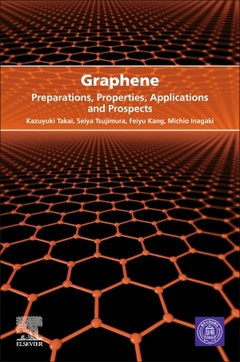Graphene Preparations, Properties, Applications, and Prospects
Auteurs : Takai Kazuyuki, Tsujimura Seiya, Kang Feiyu, Inagaki Michio

Graphene: Preparation, Properties, Applications and Prospects provides a comprehensive introduction on the science and engineering of graphene. The book is composed of 9 chapters, including a discussion on what graphene is, detailed descriptions of preparation procedures, applications based on respective properties, including electrical, chemical, mechanical, thermal and biomedical, and reviews on materials derived from graphene (graphene derivatives) and other layered materials.
Secondary audience: Graduate and post-graduate students and researchers studying and researching nanomaterials.
Seiya Tsujimura is Associate Professor in the Faculty of Pure and Applied Sciences at the University of Tsukuba, in Japan. He received his PhD from Kyoto University, on energy conversion systems based on bioelectrocatalytic reactions. His research lies at the interface of electrochemistry and biological redox reactions. His group employs engineered biocatalysts and nano-structured electrode materials to design new biosensing systems with higher accuracy, and biofuel cells with higher power density. He is the editor of Electrochemistry, from the Electrochemical Society of Japan, and has published widely in the field
Feiyu Kang received his PhD from The Hong Kong University of Science and Technology in 1997. He is honorary editorial advisory board of international journal CARBON, Joint Chairmen of international symposiums: CARBON2002 (Beijing), Carbon2011 (Shanghai) and 15th International Symposium on Intercalation Compounds (ISIC15), Coordinators of international research projects: Professor M. Inagaki (NSFC-JSPS) and Professor I. Mochida (JST-MOST).
Prof. Kang has investigated graphite and carbon materials since 1988. His research interest includes nano-carbon materials, graphite producing process, porous carbon and nuclear graphite. Prof. Kang had published more than 200 scientific papers and 3 books.
Michio Inagaki, Ph.D. is a famous carbon material scientist, who obta
- Provides differentiation on two kinds of graphene, graphene with highly-crystalline layers and reduced graphene oxide with highly-defective layers
- Thorough reviews a wide variety of preparation procedures of two kinds of graphene, including the formation of graphene foams, films and horns, and the doping of foreign atoms
- Contains a comprehensive review of electrical, chemical, mechanical, thermal and biomedical properties and applications based on these properties
Date de parution : 10-2019
Ouvrage de 620 p.
19x23.3 cm
Thème de Graphene :
Mots-clés :
Adsorption; Antibacterial; Bandga; Biosensors; Carbon materials; Cell cultivation; Chemical sensors; Chemical synthesis; chemical vapor deposition; cleavage; CVD; Drug delivery; Electrochemical capacitors; Electronic structure; Excellent biocompatibility; Field effect transistors; Fluorographene; Fuel cells; Graphane; graphene oxide; Graphene oxide; Graphene; Graphyne; Hexagonal boron nitride; High mechanical properties; High thermal conductivity; Highly crystalline layer; Highly defective layer; Hydrogenation; Layer-by-layer composites; Lithium-ion batteries; Mechanical reinforcement; Mechanical sensors; Nanofluids; Nanolubricants; Number of layers; p; Photon detection; Prospects; Reduced graphene oxide fibers; reduction; Resistance standard; Silicene; Spintronic; SWCNT; Thermal conductivity; Thermal energy storage; Thermal interface materials; Transition metal sulfides



